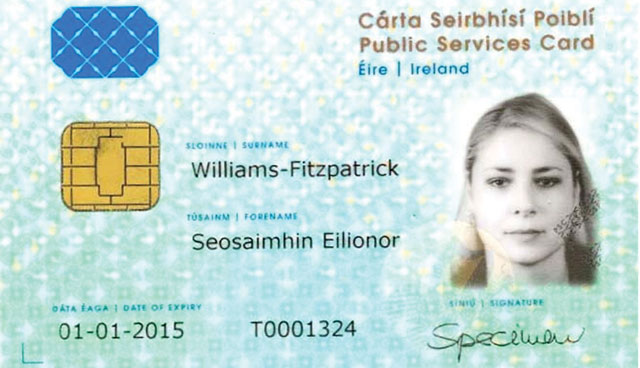Promoting the Public Services Card


The planned expansion of use for the Public Services Card (PSC) has brought with it fresh criticism that the Government is introducing a socially-unpopular national identity card.
Originally designed to increase security and reduce fraud around social welfare benefits, the planned roll-out to make the PSC mandatory to access other public services has brought with it a fresh wave of criticism.
While the Government maintain that the PSC is not compulsory, from next year citizens applying for a passport or a driving license will also be required to have registered for a card and it has now been mooted that a future step could include online Revenue services and even voter registration.
The digitisation of State data brought with it a need for greater standards of verification to combat fraud. While the Government have highlighted the significant revenue being saved through fraud identification, critics of the PSC have described it as a “national identity card by stealth” and expressed concerns about the need for the Government to hold an inevitable central database of citizens’ personal data and their ability to secure it.
Recently, the Government embarked on a campaign to mitigate against the negative coverage the PSC has been receiving and hopes to build on the three million registered citizens targeted by the end of 2017.
The campaign is a direct response to criticism levelled by the Data Protection Commissioner over a lack of transparency for the public and service users around the mandatory use of the PSC for accessing public services.
In a statement Data Protection Commissioner Helen Dixon said: “While a framework to authenticate identity for individuals availing of State services is an entirely legitimate government policy choice, transparency to the public on the underpinning legislative provisions, what data is being collected, for what purpose, and with whom data may be shared and for what purpose, needs to be adequately addressed.”
The first major step in the positive PR campaign has been the recent publication of a report on the Department of Employment Affairs and Social Protection website, outlining 54 questions and answers about the PSC and the MyGovID digital identity system.
Welcoming the move Dixon said that engagement between the Government and the Data Protection Commission (DPC) is ongoing, with the DPC set to formally investigate the level of compliance under the Irish Data Protection Acts of 1988 and 2003.
The Irish Times has reported that it obtained a briefing document which shows plans to tender for a €200,000 media strategy and creative campaign to encourage uptake of the card and “address the concerns in the media”.
As well as identifying the need to promote awareness around the PSC/MyGovID’s ability to increase access to public services and reduce fraud, the briefing document also pinpointed demographic targets.
While acknowledging that a wide variety of Ireland’s demographic have yet to take up on the card, there will be a focus on young people and people of working age, “particularly males”.
Although not helpful in increasing update of the card, the recent news that farmers will not be required to hold a card to access EU funds will reinforce the Government’s “mandatory” claim. Although the Department of Agriculture has stressed its commitment to adopting the PSC and MyGovID by September 2018, it said that the card will be an “alternative” way of accessing Agfood.ie services.





